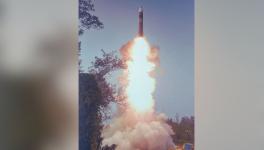Indian Activists Join Global Opposition to Government’s Deep Ocean Mission
Representational use only. Image Source: Eco-Business.com
April 9, Bengaluru: Indian activists have joined worldwide environment conservationists and oceanographers in opposing the recently announced Deep Ocean Mission by the Government of India.
The Mineral Inheritors Rights Association (MIRA) – an association of several civil society groups and networks in India – has called for a “moratorium” on the proposal by the government to explore the ocean floor for minerals. A press release and a letter sent by the association to the secretary of the Ministry of Earth Sciences said the “mission will not only have a disastrous impact on the ocean ecosystem but would also deeply impact the lives & livelihoods of the local communities who are dependent on (the) ocean (sic).”
The MIRA statement came a week after global corporate giants Google, BMW, Volvo and Samsung announced their support to a moratorium on deep seabed mining for minerals to be used in electric vehicle batteries and other products. “It is increasingly becoming evident that deep sea mining would have disastrous impacts on the environment and humankind,” MIRA’s press release said.
Quoted in MIRA’s press release, Nandikesh Sivalingam, Director of Center for Research on Energy and Clean Air and a member of MIRA, remarked, “given our record on how we have dealt with environment destruction, pollution laws and community rights for surface mining, there is no evidence to suggest that deep sea mining would be done in any responsible manner”.
In addition, the MIRA statement quoted Natalie Lowrey of the Deep Sea Mining Campaign (an association of NGOs and citizens from the Pacific, Australia, Canada, and USA) who have been campaigning for ‘No Deep Sea Mining’ for the past decade, as saying: “there are currently no operating deep sea mining projects in the world. The only project to be given a green light to operate has left the Papua New Guinea Government and investors in debt and a chorus of opposition to the industry from Churches, NGOs, and coastal communities.”
“The more we explore the deep sea the more we are learning of the complex eco-systems that exist. Environmental concerns are being raised by governments, internationally recognised scientists and civil society across the globe. Over 90 organisations and individuals, the European Parliament, and Pacific governments including Fiji, Vanuatu and Papue New Guinea calling for a moratorium on deep sea mining. While others including Sir David Attenborough and the recently launched The Pacific Blue Line are calling for a ban globally,” Lowrey continued. “We sincerely hope India join the call to halt exploration and exploitation of our deep seabeds.”
What is the Deep Ocean Mission?
Announced by Union Finance Minister Dr. Nirmala Sitharaman in the Union Budget on February 3, the Deep Ocean Mission – to which about Rs 4,168 crore has been allotted over the next five years – intends to “tap vast marine living and non-living resources including strategic polymetallic nodules such as Copper, Nickel, Cobalt and Manganese in 75,000 sq. km of area in the central Indian Ocean Basin” for which “high-tech ‘underwater vehicles’ and ‘underwater robotics’ will be used for deep-sea mining” reported The Times of India. This would “put India in the category of the select group of nations including the US, China, Japan, Germany and Canada, conducting oceanographic research in the deep sea,” the report added.
A March 15 press release by the Ministry of Earth Science, that has been designated as the nodal agency for implementing the programme, elaborated on the mission’s details further. “The Deep Ocean Mission is proposed as multi-ministerial multi-disciplinary programme with emphasis on
development of deep sea technology, exploration of deep sea mineral resources and biodiversity, acquisition of a research vessel for exploration, deep sea observations, and capacity building,” the Ministry’s release said.
The mission’s major objectives are to include development of technologies for deep sea mining, underwater vehicles and underwater robotics (allotted Rs 1538 crore); development of ocean climate change advisory services (allotted Rs 100 crore); technological innovations for exploration and conservation of deep sea biodiversity (allotted Rs 425 crore); deep ocean survey and exploration (allotted Rs 1285.50 crore); proof of concept studies on energy and freshwater from the ocean (allotted Rs. 100 crore); and establishing (an) advanced marine station for ocean biology (allotted Rs 720 crore), the release said, basing its information on a written reply by Dr. Harsh Vardhan, Union Minister for Science and Technology, Earth Sciences, Health and Family Welfare, to a question asked by a parliamentarian in the Lok Sabha on March 12.
The programme is set to be conducted in two phases – with a total of Rs. 2857.35 crore allotted to the first phase, and Rs. 1311.15 to the second – and will be reviewed by the government in 2024, between the two phases, the release added.
“The Deep Ocean Mission is proposed to be a Central Sector Scheme and no separate allocation for States is envisaged. It is proposed to collaborate with non-governmental organizations for research collaboration for various components of Deep Ocean Mission,” the release mentioned.
“It is proposed to develop, test and demonstrate the mining technology for harvesting of polymetallic nodules from the Test Mine Site (TMS) in the allocated area of 75,000 sq. km in the Central Indian Ocean Basin (CIOB). A manned submersible for 6,000 m depth is also proposed to be developed as an ocean exploratory tool,” the release concluded.
While the government’s public statements so far do not reveal which other agencies of the government will be involved in the programme, a report from November 22, 2020, by the Press Trust of India, that anticipated the soon-to-happen launch of the programme, quoted M. Rajeevan, the Ministry of Earth Sciences' secretary. He said the mission, that he called “futuristic and game-changing”, was set to include “government departments like the Defence Research and Development Organisation (DRDO), Department of Biotechnology, Indian Space Research Organisation (ISRO), and the Council for Scientific and Industrial Research (CSIR)” as stakeholders.
The PTI report quoted a senior un-named official of the ministry who noted that the move is “strategically significant as it will enhance India’s presence in the Indian Ocean where other players like China, Korea and Germany are active,” and pointed out that shortly prior, China had live-streamed footage of its new manned submersible parked at the bottom of the Mariana Trench, the deepest underwater valley on the planet. India has ear-marked nearly 150,000 square kilometers of area in the central Indian Ocean for exploration, the report noted, adding that in September 2016 India won exclusive rights for 15 years to explore for polymetallic sulphides in the Indian Ocean (that would include raw materials for the production of iron, copper, zinc, silver, gold and platinum).
The International Seabed Authority (ISA), a UN-backed body of 167 countries that granted India these exclusive rights, has issued exploration contracts, but is yet to pass mining regulation, without which mining of the ocean floor can not begin. The official quoted by PTI stated: “The aim is to be prepared when rules are formalised in this area. The deep oceans frontier is yet to be explored. We have been working on it on a piecemeal basis but the thrust is to carry out work on mission mode.”
The Criticism
The World Conference on World Peace Through Law, 1967, referred to the high seas as “the common heritage of mankind,” and asserted the responsibility of humans to care for and protect the environment, of which we are a part, for present and future generations. This theme runs through the opposition to deep sea mining that has appeared from various quarters.
A comprehensive December 2020 report titled “Ocean Solutions that Benefit People, Nature and the Economy,” commissioned by the High Level Panel for a Sustainable Ocean Economy (an international civil-society organisation) said “until the need for, and potential consequences of, deep-sea mining are better understood, the concept is conceptually difficult to align with the definition of a sustainable ocean economy and raises various environmental, legal and governance challenges, as well as possible conflicts with the UN Sustainable Development Goals.”
It further elaborated: “Current scientific understanding of deep-sea ecosystems—the range of species, their movements, ecological connectivity and susceptibility to mining stress—is still in its infancy. Deepsea communities are known to recover from disturbance very slowly, if at all. The impact of deepseabed mining on marine life— with its associated toxicity, dredging, noise and intense disturbance of the seafloor—is likely immense given the great longevity (thousands of years) and slow growth of many deep sea animals.”
Crucially, it continues, saying the “profitability of national mining operations, without governmental support or comparably low taxes, remains questionable. If the operations are profitable, it will also raise questions about the equitable sharing of profits derived from a resource taken out of humanity’s common heritage.”
Meanwhile BMW, Volvo, Google and Korean battery maker Samsung SDI, vowed in a statement on March 31 to not buy metals produced from deep-sea mining until the environmental risks of the activity are “comprehensively understood.”
Mining news website Mining.com noted that these are the first global businesses to support a call from the World Wildlife Fund for a moratorium on mining the seabed. They also said that they will not finance any deep sea mining companies.
“Before any potential deep seabed mining occurs, it needs to be clearly demonstrated that such activities can be managed in a way that ensures the effective protection of the marine environment,” the companies said in the statement.
“All alternatives to deep sea minerals must be explored as a matter of urgency, with a focus on reducing demand for primary metals, transitioning to a resource-efficient, closed-loop materials economy, and developing responsible terrestrial mining practices,” the companies noted.
MIRA’s letter to Rajeevan echoed similar concerns. The letter noted that The National Mineral Policy 2019 declared “Natural resources, including minerals, are a shared inheritance where the state is the trustee on behalf on the people to ensure that future generations receive the benefit of inheritance.” Despite this, the letter noted, “we have already over-exploited and under-valued the land based mineral wealth in our country, an irreparable loss for the future generations and the biodiversity.”
Hence, MIRA’s letter stated that “since there is very limited research around deep sea and marine environment that makes it difficult to assess the potential impacts of deep sea mining, it is in the best interest of the environment and people, to place a moratorium to this proposal to extract minerals from deep sea.”
The author is an independent journalist based in Bengaluru.
Get the latest reports & analysis with people's perspective on Protests, movements & deep analytical videos, discussions of the current affairs in your Telegram app. Subscribe to NewsClick's Telegram channel & get Real-Time updates on stories, as they get published on our website.
























